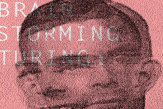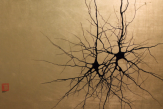Educate Their Whole Being
 In the next 30 years, according to UNESCO, more people worldwide will be graduating through education than since the beginning of history. It’s the combination of technology and its transformation effect on work, demography and the huge explosion in population. Suddenly, degrees aren’t worth anything. Isn’t that true?
In the next 30 years, according to UNESCO, more people worldwide will be graduating through education than since the beginning of history. It’s the combination of technology and its transformation effect on work, demography and the huge explosion in population. Suddenly, degrees aren’t worth anything. Isn’t that true?
Education is shifting beneath our feet. We need to radically rethink our view of intelligence. We all have bodies, don’t we? Truthfully, what happens is, as children grow up, we start to educate them progressively from the waist up. And then we focus on their heads. And slightly to one side. They become disembodied, in a kind of literal way.
We know three things about intelligence. One, it’s diverse. We think about the world in all the ways that we experience it. We think visually, we think in sound, we think kinesthetically. We think in abstract terms, we think in movement. Secondly, intelligence is dynamic. If you look at the interactions of a human brain, intelligence is wonderfully interactive.
The brain isn’t divided into compartments. In fact, creativity — which I define as the process of having original ideas that have value — more often than not comes about through the interaction of different disciplinary ways of seeing things.
And the third thing about intelligence is, it’s distinct.
Our education system has ‘mined our minds’ in the way that we strip-mine the earth: for a particular commodity. And for the future, it won’t serve us. We have to rethink the fundamental principle on which we’re educating our children. And our task is to educate their whole being, so they can face this future. By the way — we may not see this future, but they will. And our job is to help them make something of it.
*(This article is an excerpt of Sir Ken Robinson’s TEDTalk: Do Schools Kill Creativity?)

















